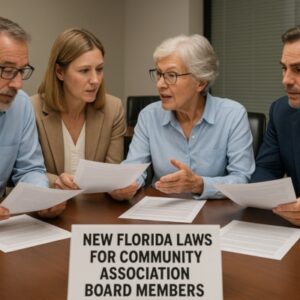What Florida Community Association Board Members Need to Know About the 2025 Legislative Changes
 By: Colten Thomas, Esq.
By: Colten Thomas, Esq.
Serving on the board of a Florida condominium or cooperative association carries significant legal and ethical responsibilities. With the passage of CS/CS/HB 913 during the 2025 legislative session, board members must now adapt to a sweeping set of changes that impact management, financial reporting, conflicts of interest, inspections, and more. Below are the most important updates and how they affect day-to-day operations.
Stricter Oversight of Managers and Management Firms
The law now bars any community association manager whose license is revoked from holding ownership, employment, or leadership roles within a management firm for a period of five years. Managers are also required to maintain accurate, up-to-date licensure records in the Department of Business and Professional Regulation’s (DBPR) online system. Associations have a legal obligation to verify these credentials before entering into or continuing management contracts. If a manager’s license is suspended or revoked during the term of a contract, the association may terminate the agreement without penalty. This change reinforces the need for proactive compliance monitoring by board members.
Stronger Conflict of Interest Rules
To promote ethical governance, the legislation expands what qualifies as a conflict of interest—particularly in connection with milestone inspections and related services. Professionals bidding on such work must disclose, in writing, any ownership or financial interest in the firm that performed the inspection. If a potential conflict exists for contracts exceeding $2,500 (for associations with fewer than 100 units) or $10,000 (for associations with 100 units or more), the association must seek at least two competitive bids. Contracts entered into without the required disclosure are voidable, and specific termination rights are outlined in the new law. Boards should update their procurement processes and retain clear documentation of all bids and disclosures.
Updated Milestone Inspection and Reserve Study Requirements
Changes to the rules around milestone inspections and structural integrity reserve studies (SIRS) impact both how inspections are conducted and how associations fund critical repairs. Associations must ensure that professionals performing these services disclose any potential conflicts of interest in writing. If not, the contracts are subject to cancellation. The law also allows associations to use lines of credit or loans to fund capital repairs identified in milestone inspections or SIRS reports. In addition, professionals who intend to bid on repair work related to their inspection must clearly disclose that intent in writing.
Flexibility in Reserve Funding
Associations may temporarily reduce or suspend reserve contributions for structural items governed by the SIRS, but only after completing a milestone inspection and obtaining approval from a majority of the total voting interests. Before resuming contributions, the association must conduct a new structural integrity reserve study to confirm adequacy of funding. These changes offer flexibility, but require strict adherence to the statutory process.
Board and Owner Meetings: Virtual Participation and Recordkeeping
The law permits association board meetings to be held in person or via video conference, provided proper notice is given and meeting records are retained as official association documents. Owner meetings—including budget discussions and elections—can also be conducted online, with electronic voting expressly authorized. Specific notice procedures, quorum requirements, and recordkeeping rules ensure transparency in both physical and digital formats.
Insurance and Financial Disclosure Obligations
All condominium associations must maintain sufficient property insurance, as determined by an independent appraisal. Financial reporting and document disclosure requirements have also been strengthened. Associations must now post financial reports and other official records on a secure website or mobile application within statutory timeframes. Board members must execute affidavits verifying that reports were delivered in accordance with statutory deadlines. In addition, boards are expected to use best efforts when investing reserve and operating funds, further emphasizing fiduciary accountability.
Bottom Line
Florida’s 2025 legislative reforms introduce a new era of oversight and responsibility for community association boards. Board members must stay informed and responsive—verifying manager credentials, documenting meetings and financial records, disclosing conflicts, and managing reserve funding with care. These changes are designed to protect associations and their members, but they also raise the bar for compliance.
Working with qualified legal counsel ensures your board stays on track with the new requirements and avoids exposure to legal risk. The more proactive and transparent your governance, the stronger and more resilient your community will be.
This article is for informational purposes only and does not provide legal advice. Please do not act or refrain from acting based on anything you read here. Please review our full disclaimer for more information. Relying on the information provided in this article or communicating with Henderson, Franklin, Starnes & Holt, P.A. through our website does not create an attorney/client relationship. Legal counsel and analysis will not be provided to non-clients. If you are interested in retaining our attorneys, please contact us here.

